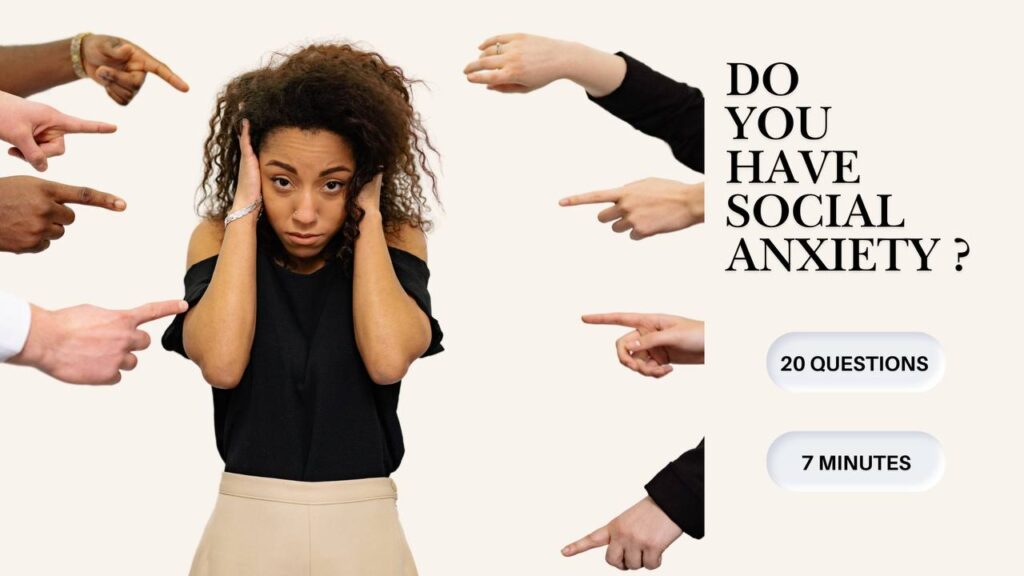
Results
High Social Anxiety
- What This Means: Your responses suggest significant challenges related to social anxiety.
- Insights:
- Likely experience fear or discomfort in social situations.
- May overanalyze interactions or fear negative judgment.
- Avoidance of social settings might impact personal and professional growth.
- Next Steps:
- Consider seeking support from a therapist or counselor to explore coping strategies.
- Practice gradual exposure to social situations to build confidence.
- Engage in mindfulness exercises to reduce anxiety in the moment.
Moderate Social Anxiety
- What This Means: Your responses indicate moderate social anxiety, impacting some areas of life.
- Insights:
- Often feel uneasy in social situations, though not completely avoidant.
- Likely worry about judgment or making mistakes in public.
- May have some strategies to manage anxiety but still find it challenging.
- Next Steps:
- Reflect on specific triggers and develop a plan to address them.
- Practice relaxation techniques, such as deep breathing, before social events.
- Build self-confidence through positive self-talk and gradual challenges.
Balanced Approach
- What This Means: Your responses suggest a balanced level of social comfort and anxiety.
- Insights:
- Occasionally feel nervous in certain situations but handle most interactions well.
- Likely able to navigate social settings with a mix of confidence and caution.
- May benefit from refining communication skills to further boost confidence.
- Next Steps:
- Continue to build social skills through practice and positive interactions.
- Reflect on any lingering fears and address them with targeted strategies.
- Encourage others with social anxiety by sharing your balanced approach.
Socially Confident
- What This Means: Your responses indicate low levels of social anxiety, suggesting confidence in social settings.
- Insights:
- Likely comfortable interacting with others and handling social challenges.
- Rarely overthink social interactions or fear judgment.
- Well-equipped to navigate a variety of social situations with ease.
- Next Steps:
- Use your confidence to support others who may struggle in social settings.
- Reflect on ways to further strengthen your communication and networking skills.
- Explore opportunities to lead or mentor in group settings.
Highly Socially Confident
- What This Means: Your responses suggest little to no social anxiety, with strong confidence in all interactions.
- Insights:
- Likely enjoy socializing and thrive in group settings.
- Rarely experience nervousness or discomfort in public.
- May be perceived as approachable and charismatic.
- Next Steps:
- Continue using your strengths to build and maintain meaningful relationships.
- Reflect on how your confidence influences your personal and professional growth.
- Look for opportunities to empower others who struggle with social anxiety.
#1. I avoid public speaking.
#2. I’m always eager to answer a text or call.
#3. I consider myself to be a shy person.
#4. I enjoy meeting and talking to new people.
#5. Knowing I will attend a party on the weekend stresses me out all week.
#6. I think meetings are the worst part of the workday.
#7. When I disagree with someone, I usually keep it to myself.
#8. I find it difficult to relax at a party unless I’ve had some alcohol.
#9. It’s not easy for me to talk to someone I find attractive.
#10. I believe other people want to hear what I have to say.
#11. At social gatherings, I blush, sweat, and feel my heart race.
#12. I always try to speak loudly and clearly.
#13. I can get nervous when I have to speak to a boss or a teacher.
#14. I don’t like being asked to join in when people are singing or dancing.
#15. I’m OK with not having any social plans on the weekend.
#16. I get embarrassed easily, even around people I know.
#17. I have lied to avoid a social gathering, or to leave one early.
#18. I try to avoid restaurants where other people can see me.
#19. Before a social event, I spend a lot of time thinking about who I’ll talk to and what I might say.
#20. Direct eye contact can make me uncomfortable.
Previous
Finish


